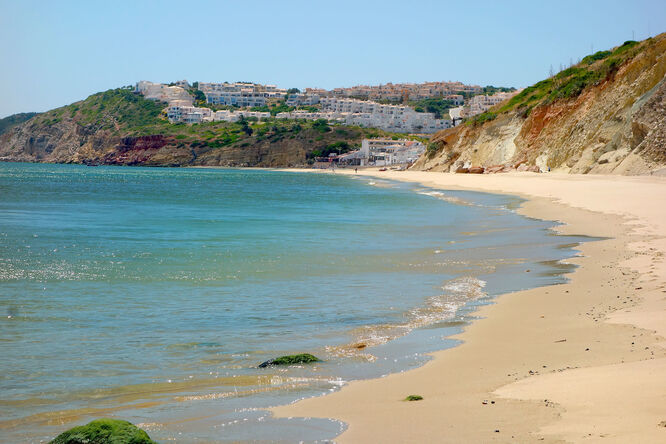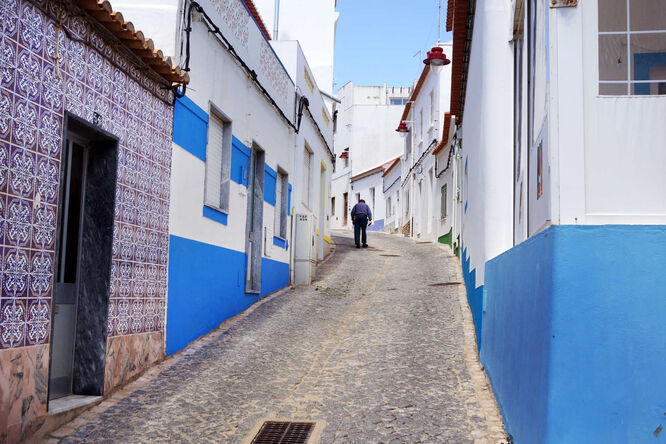Slowing Down in Sleepy Salema
By Rick Steves
By the time any place is famous for being a "last undiscovered tourist frontier," it no longer is one. The Algarve, the region that stretches across Portugal's entire south coast, disappoints many who come looking for fun on undeveloped beaches. But the savvy traveler can still find places where colorful boats share the beach with a colony of sun-worshipers. The Algarve of your dreams survives — just barely. Find it in Salema.
The town is blessed with a long, broad, gorgeous beach — luxurious with powder-fine sand, framed off by steep vivid-yellow cliffs, and relatively untrampled by rowdy tourists. For my money, it may be the most purely enjoyable beach in all of Europe.
When I first came to Salema, in the late 1970s, the road into town wasn't paved. I turned up in the early evening, driving a group of eight in a minivan and with no reservations. I parked at one end of the town's "street of fishermen" (Rua dos Pescadores), flagged down some locals, and asked, "Quartos?" Within minutes I'd found nine beds in private homes for a few bucks each.
While the street looks pretty much the same today, the character of the town is changing. Nowadays, Portuguese beach towns like Salema are becoming the playgrounds of an international crowd of retirees and vacationers, who stay in newly built gated communities and golf clubs on the inland hilltops. The ladies who once rented out rooms have disappeared, chastened by stricter government regulations (necessary, as southern Europe learns to pay its taxes). There are fewer shoestring-budget backpackers to keep them in business anyway.
Still, the children of the old fishermen — at least those who haven't gone to the big city in search of jobs — continue to cook up the fish and staff the weather-beaten fort. Most of the fishing business is done in bigger markets nearby, in Sagres and Lagos. But if you go out to the beach at night in Salema you'll still see six or seven boats out on the water, their lights bobbing on the horizon, as local fishermen work to catch squid, sardines, and octopus. In the calm of the summer, boats are left out on buoys. In the winter, a community-subsidized tractor earns its keep by hauling the boats ashore. (In pre-tractor days, such boat-hauling was a 10-person chore.)
Like many of my favorite places in Europe, Salema has a community of locals that seem to live their traditional routines in a parallel existence with the modern world, oblivious to the tourists who are just another and necessary slice of the local economy.

Not surprisingly, the town's handful of small, family-run restaurants specialize in one thing: fresh seafood. Happily, those that face the beach are the most fun, with the best service, food, and atmosphere. The Atlântico is popular, right on the beach. It's especially atmospheric when the electricity goes out, and faces flicker around the candles. The Boia Bar, at the base of the residential street, is simple and friendly, with huge portions and a few tables within splashing distance of the surf.
Out on Salema's beach, residents and tourists pursue a policy of peaceful coexistence. Two-year-olds toddle in the waves, supine women read German fashion magazines, and old men mend their nets.
On one end of the beach, at low tide, you can usually scramble over the rocks past tiny tide pools to secluded Figueira Beach. (But if the tide comes in, your route back will be over land.) While the days of black-dressed widows chasing unclad Nordic women off Figueria Beach are gone, topless bathing is still risqué today. Sun worshippers disrobe with discretion.
If you feel the need to do some touring, a 15-minute drive to the west gets you to the most romantic beach in the region: Praia do Castelejo, complete with a good restaurant (near Cape Sagres). If you head in the other direction, you'll trip into the beach-party/jet-ski resort of Lagos.
But Salema's sleepy beauty nearly always kidnaps my momentum. My typical day begins and ends with the sound of waves. In the morning, I amble over to one of the hidden beaches within walking distance of town. I grab a late lunch overlooking the water, spend the afternoon relaxing on the town beach, catch the sunset with a drink in my hand, have a nice beachside dinner of grilled sardines — and then fall asleep to the steady thrum of the surf.
Tomorrow I'll do it all over again. You should too. Idyllic Salema remains a delightful stop on any Iberian itinerary.

